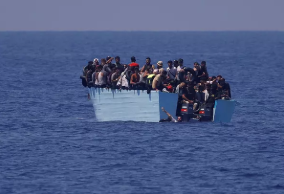Pakistan Takes Action: Dismisses and Blacklists Officials After Mediterranean Deaths
Introduction
In a significant move, Pakistan has taken strict measures against several of its government officials following a tragic incident in the Mediterranean Sea. The incident involved the deaths of numerous migrants attempting to reach Europe via perilous routes. In response to the incident, Pakistan’s government has sacked and blacklisted dozens of officials allegedly connected to facilitating the illegal trafficking of migrants. This event has sparked widespread concern and prompted questions about the role of government officials and agencies in the illegal migration network.
The Mediterranean Tragedy
The Mediterranean Sea has long been a major route for migrants seeking to escape conflict, poverty, and instability in their home countries, including Pakistan. However, the journey is notoriously dangerous, with thousands of lives lost over the years due to overcrowded and unsafe vessels. The tragedy that led to Pakistan’s decisive action occurred when a boat carrying dozens of Pakistani migrants capsized while attempting to cross from North Africa to Europe.
The boat’s overcrowded conditions and the lack of safety measures led to its tragic sinking, which claimed the lives of many of the passengers. This disaster highlighted the immense risks associated with illegal migration routes, drawing international attention to the issue of human trafficking and unsafe travel conditions.
Government Response: Dismissals and Blacklisting
In response to the incident, the Pakistani government moved swiftly to hold individuals accountable for their role in facilitating illegal migration. Dozens of officials, ranging from law enforcement officers to employees in relevant government departments, have been sacked. The Pakistani Ministry of Interior and other related agencies launched an extensive investigation into the incident, leading to the identification of key officials involved in the migrant trafficking network.
The officials who were dismissed or blacklisted are accused of being complicit in helping organize illegal migration and enabling the trafficking of vulnerable individuals. These individuals allegedly used their positions of power to bypass immigration controls and issue false documents or permits to migrants, facilitating their journey to Europe.
Pakistan’s decision to sack and blacklist these officials sends a strong message that the government is committed to rooting out corruption and cracking down on the illegal trafficking networks that exploit vulnerable citizens. The blacklisting of the officials also prevents them from holding any government position in the future, a move aimed at ensuring long-term accountability.
The Role of Human Trafficking in the Crisis
Human trafficking remains one of the main drivers behind illegal migration from Pakistan and other countries in South Asia. Desperate individuals, often from impoverished backgrounds, fall prey to traffickers who promise them a better life abroad. These traffickers use deceptive means to convince migrants to embark on dangerous journeys, offering false hope of a better future in Europe.
The network of traffickers often works with corrupt officials who facilitate the movement of these migrants. From providing fake passports and visas to offering bribes to border security, these officials allow traffickers to operate with impunity. This network has contributed to the increasing number of deaths in the Mediterranean, as overcrowded and poorly maintained vessels become the primary means of transportation for those seeking a better life in Europe.
Pakistan’s recent actions to hold officials accountable are a recognition of the role corruption plays in exacerbating the illegal migration crisis. The country is also under pressure from international organizations to address these networks and take meaningful steps to prevent further tragedies.
Impact on Pakistani Society
The incident has had a profound impact on Pakistani society. The families of the deceased migrants are grieving the loss of loved ones, and many are now questioning the safety and efficacy of migration routes. The incident has also raised awareness about the need for better support systems for those seeking migration, both within Pakistan and in the countries they attempt to enter.
This tragedy has highlighted the vulnerability of individuals who are desperate to escape dire situations. Migrants are often unaware of the dangers involved and fall victim to ruthless traffickers who promise a brighter future but instead lead them to their deaths. In the aftermath of the incident, many are calling for stronger legal measures to protect migrants and prevent exploitation by criminal networks.
International Reactions and Accountability
The international community has expressed shock and sympathy following the tragedy. Organizations such as the United Nations and various human rights groups have condemned the actions of traffickers and emphasized the need for stronger border controls and more comprehensive migrant protection measures. Many have also called for greater accountability from governments in source countries, urging them to take a harder stance against corruption and trafficking.
Pakistan’s actions, although significant, are just a part of a broader international effort to combat illegal migration and human trafficking. The incident has also drawn attention to the need for international cooperation in addressing the root causes of migration, including poverty, conflict, and lack of opportunity.
Conclusion
Pakistan’s decision to sack and blacklist dozens of officials in response to the Mediterranean deaths is a bold step in addressing the illegal migration crisis and human trafficking. By holding officials accountable, the government is sending a clear message that it is serious about combatting corruption and protecting its citizens from exploitation.
However, while these measures are an important first step, more needs to be done to tackle the underlying causes of illegal migration. This includes creating more opportunities for people to stay in their home countries, improving border security, and providing better support for migrants at every stage of their journey. Only through a comprehensive and cooperative approach can the international community hope to reduce the number of lives lost in tragic incidents like the one in the Mediterranean.
Read More: Thousands demand impeachment of Philippines Vice President Sara Duterte


Leave a Comment